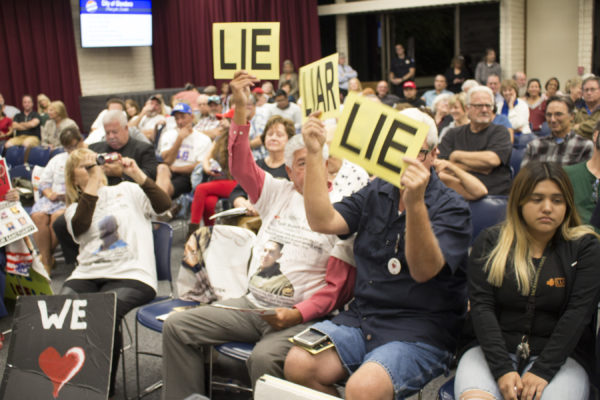SB 54 opposers defend call for violence against immigrants
A Glendora town hall meeting about the state immigration law ended in shouts and police intervening between immigration protesters on Oct. 11.
A state fiscal and policy analyst, a Los Angeles County Sheriff commander and theGlendora City Attorney William Wynder outlined state immigration laws, enforcement and the city’s position.
City hall meetings over the summer were packed with residents protesting the city’s decision to join a federal lawsuit challenging California sanctuary state law—State Senate Bill 54.
Wynder said the lawsuit will take years to resolve and and will be decided by the U.S. Supreme Court.
“We all know it’s going to end up before the supremes, so let’s move the process along,” Wynder said.
Most of the 100 people in attendance at the town hall meeting supported the lawsuit. Many wore paraphernalia supporting President Donald Trump.
They repeatedly claimed immigration increases violent crime.
Pitzer College professor emeritus of Chicano studies Jose Calderon cited a New York Times article by Anna Flagg from March, “The Myth of the Criminal Immigrant.”
“In general, the study’s data suggests either that immigration has the effect of reducing average crime, or that there is simply no relationship between the two,” the report says.
The article cites a 2016 report by nonprofit news organization the Marshall Project. Fifty-four communities were surveyed over 34 years.
“In general, the study’s data suggests either that immigration has the effect of reducing average crime, or that there is simply no relationship between the two,” the report says.
People shouted “fake” and told Calderon to “shut up” when he referenced the study.

Attendees were permitted questions about immigration laws directed to the panel, but they were not allowed to discuss the city’s actions, nor question members of the city council.
Several Citrus College students attended. Associated Students of Citrus College president Fernando Flores and student trustee Yachi Rivas have gone to several city meetings on the subject.
A contingent of city supporters came from two organizations listed by the Southern Poverty Law Center as “nativist extremist” groups: We the People Rising and the Remembrance Project.
SPLC is a nonprofit civil rights law firm that maps hate groups nationwide.
Members of the groups shouted down opposing participants, including Flores when he asked a question. They interrupted the panelists.
Some attendees supporting the federal lawsuit traveled from as far as Huntington Beach, Torrance and Pasadena to participate.
The most tense moment came after the founder of “Welcome to Glendora,” Teri Merrick, asked the panel a question. Her group opposes the suit against California’s sanctuary law.
“What advice would you give the citizens of Glendora, the city council?” Merrick said. “How we can find common ground to support our residents?”
A lawsuit supporter responded out of turn.
“Promptly shoot all illegals,” the man said.
Attendees gasped and shouted. Calderon raised his voice for the first time that night.
“Is this what you want to be known for?” Calderon said.
The man replied, “Yes, absolutely.”
Members of We the People Rising and the Remembrance Project defended the comment. Flores, Rivas and another member of Latinos Unidos Student Association hung their heads after the shouting.
“Shouldn’t we reaffirm those core values of equal treatment—community, family?” Calderon said.
After the event closed, members of the We the People Rising and the Remembrance Project confronted Merrick before police intervened.
Glendora city council member Gary Boyer has been the council’s most outspoken challenger of SB 54. After the meeting, his hands were shaking.
“Unfortunately, in today’s political climate, people are very polarized and very passionate,” Boyer said. “Unfortunately, sometimes things get said that people wouldn’t say to each to other on a face-to-face basis.”
Before the meeting, Boyer was hopeful the meeting would be constructive.
“(Panelists) gave factual, accurate information and hopefully people will come away understanding things better than when they came tonight,” Boyer said.
This article originally ran in print on Oct. 24.


